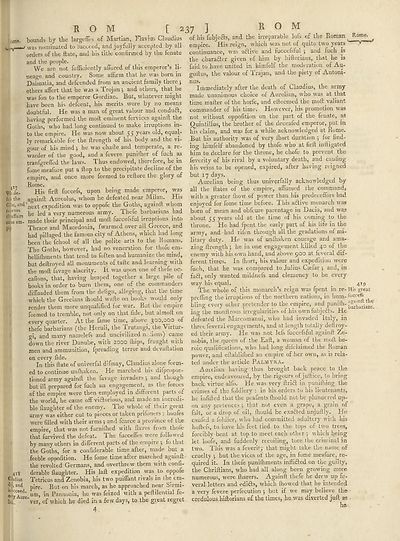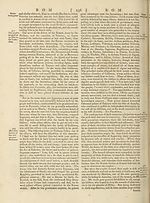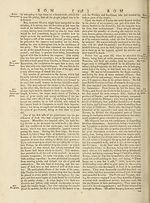Encyclopaedia Britannica, or, a Dictionary of arts, sciences, and miscellaneous literature : enlarged and improved. Illustrated with nearly six hundred engravings > Volume 18, RHI-SCR
(245) Page 237
Download files
Complete book:
Individual page:
Thumbnail gallery: Grid view | List view

nm.
\X1
V i de¬
ft the
C is, and
rt eves
tf'taffairs
ofcie etn-
p:i
418
Chdius
3 , and
isicceed-
Wjy Aure
li;
ROM [2
bounds by the large®■$ of Martian, Flavius Claudius
was nominated to lueceed, and joyfully accepted by all
orders of the (late, and his title confirmed by the fenate
and the people.
We are not fuffieiently allured of this emperor’s li¬
neage and country. Some atlirm that he was born in
Dalmatia, and defcended from an ancient family there j
others aflert that he was a Trojan •, and others, that he
was fon to the emperor Gordian. But, whatever might
have been his defcent, his merits were by no means
doubtful. He was a man of great valour and conduft,
having performed the molt eminent fervices againll the
Goths, who had long continued to make irruptions in¬
to the empire. He was now about 55 years old, equal¬
ly remarkable for the ftrength of his body and the vi¬
gour of his mind y he was ehatle and temperate, a re-
warder of the good, and a fevere punilher of fuch as
tranfgreffed the laws. Thus endowed, therefore, he in
fome meafure put a Hop to the precipitate decline of the
empire, and once more feemed to reftore the glory of
Rome.
His firfl fuccefs, upon being made emperor, was
againft Aureolus, whom he defeated near Milan. His
next expedition was to oppofe the Goths, againft whom
he led a v'ery numerous army. Thefe barbarians had
made their principal and moft fuccefsful irruptions into
Thrace and Macedonia, fwarmed over all Greece, and
had pillaged the famous city of Athens, which had long
been the fchool of all the polite arts to the Romans.
The Goths, however, had no veneration for thofe cm-
belliftiments that tend to foften and humanize the mind,
but deftroyed all monuments of tafte and learning with
the moft favage alacrity. It was upon one of thefe oc-
cafions, that,' having heaped together a large pile of
books in order to burn them, one of the commanders
diffuaded them from the delign, alleging, that the time
which the Grecians (hould wafte on books would only
render them more unqualified for war. But the empire
feemed to tremble, not only on that lide, but almoft on
every quarter. At the fame time, above 300,000 of
thefe barbarians (the Heruli, the Trutangi, jhe Virtur-
gi, and many namelefs and uncivilized m:cions) came
down the river Danube, with 2000 ihips, fraught with
men and ammunition, fpreading terror and devaftation
on every fide.
In this ft ate of univerfal difmay, Claudius alone feem¬
ed to continue unfhaken. He marched his difpropor-
tioned army again!! the favage invaders 5 and though
but ill prepared for fuch an engagement, as the forces
of the empire were then employed in different parts of
the world, he came off viclonous, and made an incredi¬
ble (laughter of the enemy. Ibe whole of their great
army was either cut to pieces or taken priloners : hou(es
were filled with their arms •, and fcarce a province of the
empire, that was not furnilhed with fia/es Irom thoie
that furvived the defeat. I he iuccefles were followed
by many others in different parts of the empire } lo that
the Goths, for a confiderable time after, made but a
feeble oppofition. He fome time after marched againft
the revolted Germans, and overthrew them with confi¬
derable (laughter. His laft expedition was to oppofe
Tetricus and Zenobia, his two puiffant rivals in l he em¬
pire, But on his march, as he approached near Sirmi-
um, in Pannonia, he was feized with a peftilential fe¬
ver, of which he died in a few days, to the great regret
4 ' , '
Rome.
37 1 R 0 M
of his fubjcffs, and the irreparable lofs of the Roman
empire. His reign, which was not of quite two years
continuance, was aftive and fuccefsful ; and fuch is
the character given of him by hiftorians, that he is
faid to have united in himfelf the moderation of Au-
guftus, the valour of Trajan, and the piety of Antoni¬
nus.
Immediately after the death of Claudius, the army
made unanimous choice ot Aurelian, who was at that
time mafter of the horfe, and efteemed the moft valiant
commander of his time. However, his promotion was
not without oppofition on the part of the fenate, as
Quintillus, the brother of the deceafed emperor, put in
his claim, and was for a while acknowledged at Rome.
But his authority was of very ftiort duration •, for find¬
ing himfelf abandoned by thofe who at firl! inftigated
him to declare for the throne, he chofe to prevent the
feverity of his rival by a voluntary death, and caufing
his veins to be opened, expired, after having reigned
but 17 days.
Aurelian being thus univerfally acknowledged by
all the dates of the empire, affumed the command,
with a greater (how of power than his predeceffors had
enjoyed for fome time before. This a61ive monarch was
born of mean and obfcure parentage in Dacia, and was
about 55 years old at the time of his coming to the
throne. He had (pent the early part of his life in the
army, and had ri(en through all the gradations of mi¬
litary duty. He was of unfhaken courage and ama^
zing ftrength , he in one engagement killed 40 of the
enemy with his own hand, and above 900 at feveral dif¬
ferent times. In ftiort, his valour and expedition were
fueh, that he was compared to Julius Caffar •, and, in
fa<ft, only wanted mildnefs and clemency to be every
way his equal.
The whole of this monarch’s reign was fpent in re- His great
preffing the irruptions of the northern nations, in hum- flicce^tje
bling every other pretender to the empire, and puniih-
ing the monftrous irregularities of his own fubje£fs. He
defeated the Marcomanni, who had invaded Italy, in
three feveral engagements, and at length totally deftroy¬
ed their army. He was not lefs fuccefsful againft Ze¬
nobia, the queen of the Eaft, a woman of the moft he¬
roic qualifications, who had long difclaimed the Roman
power, and eftablithed an empire of her own, as is rela¬
ted under the article Palmyra.
Aurelian having thus brought back peace to the
empire, endeavoured, by the rigours of juft ice, to bring
back virtue alfo. He was very ftri£l in puniihing the
crimes of the foldiery : in his orders to his lieutenants,
he infifted that the peafants ftionld not be plundered up¬
on any pretences ; that not even a grape, a grain of
fait, or a drop of oil, fhuuld be exacted unjuftly. He
caufed a foldicr, who had committed adultery with his
hoftefs, to have his feet tied to the tops of two trees,
forcibly bent at top to meet each other •, which being
let loofe, and fuddenly recoiling, tore the criminal in
two. This was a feverity that might take the name of
cruelty ; but the vices of the age, in fome meafure, re¬
quired it. In thefe punifnments inflidfed on the guilty,
the Chriftians, who had all along been growing more
numerous, were fharers. Againft thefe he drew up fe¬
veral letters and edidls, which fhowed that he intended
a very fevere perfecution 5 but if we may believe the
credulous hiftorians of the times, he was diverted juft as
he /
4x9
\X1
V i de¬
ft the
C is, and
rt eves
tf'taffairs
ofcie etn-
p:i
418
Chdius
3 , and
isicceed-
Wjy Aure
li;
ROM [2
bounds by the large®■$ of Martian, Flavius Claudius
was nominated to lueceed, and joyfully accepted by all
orders of the (late, and his title confirmed by the fenate
and the people.
We are not fuffieiently allured of this emperor’s li¬
neage and country. Some atlirm that he was born in
Dalmatia, and defcended from an ancient family there j
others aflert that he was a Trojan •, and others, that he
was fon to the emperor Gordian. But, whatever might
have been his defcent, his merits were by no means
doubtful. He was a man of great valour and conduft,
having performed the molt eminent fervices againll the
Goths, who had long continued to make irruptions in¬
to the empire. He was now about 55 years old, equal¬
ly remarkable for the ftrength of his body and the vi¬
gour of his mind y he was ehatle and temperate, a re-
warder of the good, and a fevere punilher of fuch as
tranfgreffed the laws. Thus endowed, therefore, he in
fome meafure put a Hop to the precipitate decline of the
empire, and once more feemed to reftore the glory of
Rome.
His firfl fuccefs, upon being made emperor, was
againft Aureolus, whom he defeated near Milan. His
next expedition was to oppofe the Goths, againft whom
he led a v'ery numerous army. Thefe barbarians had
made their principal and moft fuccefsful irruptions into
Thrace and Macedonia, fwarmed over all Greece, and
had pillaged the famous city of Athens, which had long
been the fchool of all the polite arts to the Romans.
The Goths, however, had no veneration for thofe cm-
belliftiments that tend to foften and humanize the mind,
but deftroyed all monuments of tafte and learning with
the moft favage alacrity. It was upon one of thefe oc-
cafions, that,' having heaped together a large pile of
books in order to burn them, one of the commanders
diffuaded them from the delign, alleging, that the time
which the Grecians (hould wafte on books would only
render them more unqualified for war. But the empire
feemed to tremble, not only on that lide, but almoft on
every quarter. At the fame time, above 300,000 of
thefe barbarians (the Heruli, the Trutangi, jhe Virtur-
gi, and many namelefs and uncivilized m:cions) came
down the river Danube, with 2000 ihips, fraught with
men and ammunition, fpreading terror and devaftation
on every fide.
In this ft ate of univerfal difmay, Claudius alone feem¬
ed to continue unfhaken. He marched his difpropor-
tioned army again!! the favage invaders 5 and though
but ill prepared for fuch an engagement, as the forces
of the empire were then employed in different parts of
the world, he came off viclonous, and made an incredi¬
ble (laughter of the enemy. Ibe whole of their great
army was either cut to pieces or taken priloners : hou(es
were filled with their arms •, and fcarce a province of the
empire, that was not furnilhed with fia/es Irom thoie
that furvived the defeat. I he iuccefles were followed
by many others in different parts of the empire } lo that
the Goths, for a confiderable time after, made but a
feeble oppofition. He fome time after marched againft
the revolted Germans, and overthrew them with confi¬
derable (laughter. His laft expedition was to oppofe
Tetricus and Zenobia, his two puiffant rivals in l he em¬
pire, But on his march, as he approached near Sirmi-
um, in Pannonia, he was feized with a peftilential fe¬
ver, of which he died in a few days, to the great regret
4 ' , '
Rome.
37 1 R 0 M
of his fubjcffs, and the irreparable lofs of the Roman
empire. His reign, which was not of quite two years
continuance, was aftive and fuccefsful ; and fuch is
the character given of him by hiftorians, that he is
faid to have united in himfelf the moderation of Au-
guftus, the valour of Trajan, and the piety of Antoni¬
nus.
Immediately after the death of Claudius, the army
made unanimous choice ot Aurelian, who was at that
time mafter of the horfe, and efteemed the moft valiant
commander of his time. However, his promotion was
not without oppofition on the part of the fenate, as
Quintillus, the brother of the deceafed emperor, put in
his claim, and was for a while acknowledged at Rome.
But his authority was of very ftiort duration •, for find¬
ing himfelf abandoned by thofe who at firl! inftigated
him to declare for the throne, he chofe to prevent the
feverity of his rival by a voluntary death, and caufing
his veins to be opened, expired, after having reigned
but 17 days.
Aurelian being thus univerfally acknowledged by
all the dates of the empire, affumed the command,
with a greater (how of power than his predeceffors had
enjoyed for fome time before. This a61ive monarch was
born of mean and obfcure parentage in Dacia, and was
about 55 years old at the time of his coming to the
throne. He had (pent the early part of his life in the
army, and had ri(en through all the gradations of mi¬
litary duty. He was of unfhaken courage and ama^
zing ftrength , he in one engagement killed 40 of the
enemy with his own hand, and above 900 at feveral dif¬
ferent times. In ftiort, his valour and expedition were
fueh, that he was compared to Julius Caffar •, and, in
fa<ft, only wanted mildnefs and clemency to be every
way his equal.
The whole of this monarch’s reign was fpent in re- His great
preffing the irruptions of the northern nations, in hum- flicce^tje
bling every other pretender to the empire, and puniih-
ing the monftrous irregularities of his own fubje£fs. He
defeated the Marcomanni, who had invaded Italy, in
three feveral engagements, and at length totally deftroy¬
ed their army. He was not lefs fuccefsful againft Ze¬
nobia, the queen of the Eaft, a woman of the moft he¬
roic qualifications, who had long difclaimed the Roman
power, and eftablithed an empire of her own, as is rela¬
ted under the article Palmyra.
Aurelian having thus brought back peace to the
empire, endeavoured, by the rigours of juft ice, to bring
back virtue alfo. He was very ftri£l in puniihing the
crimes of the foldiery : in his orders to his lieutenants,
he infifted that the peafants ftionld not be plundered up¬
on any pretences ; that not even a grape, a grain of
fait, or a drop of oil, fhuuld be exacted unjuftly. He
caufed a foldicr, who had committed adultery with his
hoftefs, to have his feet tied to the tops of two trees,
forcibly bent at top to meet each other •, which being
let loofe, and fuddenly recoiling, tore the criminal in
two. This was a feverity that might take the name of
cruelty ; but the vices of the age, in fome meafure, re¬
quired it. In thefe punifnments inflidfed on the guilty,
the Chriftians, who had all along been growing more
numerous, were fharers. Againft thefe he drew up fe¬
veral letters and edidls, which fhowed that he intended
a very fevere perfecution 5 but if we may believe the
credulous hiftorians of the times, he was diverted juft as
he /
4x9
Set display mode to:
![]() Universal Viewer |
Universal Viewer | ![]() Mirador |
Large image | Transcription
Mirador |
Large image | Transcription
Images and transcriptions on this page, including medium image downloads, may be used under the Creative Commons Attribution 4.0 International Licence unless otherwise stated. ![]()
| Permanent URL | https://digital.nls.uk/193021892 |
|---|
| Attribution and copyright: |
|
|---|
| Description | Ten editions of 'Encyclopaedia Britannica', issued from 1768-1903, in 231 volumes. Originally issued in 100 weekly parts (3 volumes) between 1768 and 1771 by publishers: Colin Macfarquhar and Andrew Bell (Edinburgh); editor: William Smellie: engraver: Andrew Bell. Expanded editions in the 19th century featured more volumes and contributions from leading experts in their fields. Managed and published in Edinburgh up to the 9th edition (25 volumes, from 1875-1889); the 10th edition (1902-1903) re-issued the 9th edition, with 11 supplementary volumes. |
|---|---|
| Additional NLS resources: |
|

